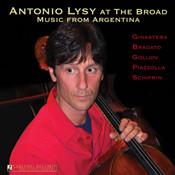Upstart Yarlung Records Gets Latin Grammy Here
Classical music recorded all-analog using purist microphone techniques are few these days. Here is one from Bob Attiyeh's Yarlung Records that is both sonically and musically exquisite.
Classical music recorded all-analog using purist microphone techniques are few these days. Here is one from Bob Attiyeh's Yarlung Records that is both sonically and musically exquisite.
Music first: Antonio Lysy is a world-renowned cellist and son of Argentinian born violinist Alberto Lysy who was a protege of Yehudi Menuhin. The father performed with Casals, Jacqueline DuPré, Benjamin Britten and Nadia Boulanger. The son has done pretty well for himself too, playing solo recitals and with first tier orchestras at top concert venues throughout Europe and around the world.
On this record, he's joined by pianist Bryan Pezzone, who performs with the Los Angeles Chamber Orchestra, the L.A. Philharmonic among others. He's worked with contemporary composers John Adams, John Harbison, and Pierre Boulez among others.
Also onboard is Argentinian bass player Pablo Motta, who plays with various Tango and big band ensembles and The Capitol Ensemble, a string quartet that has played with Rostropovich, Neville Mariner, Janos Starker, Michael Tilson Thomas, the aforementioned Menuhin and Leonard Bernstein.
The point I'm trying to get across with those credits is that this is music making of the highest caliber to go along with analog recording quality of the highest caliber. How often does that happen?
The repertoire consists of music written by Argentinian composers Alberto Ginastera, Lalo Schifrin, and Tango master Astor Piazzolla. Some musicangle readers might be familiar with Ginastera from the "Estancia" and "Panambi" ballet suites that were on Classic Records' superb reissue from 35MM tape of Everest SDBR 3041, which featured Villa-Lobos' delightful "The Little Train of the Caipira" from Bachianas Brasileiras No. 2".
Many will be familiar with Mr. Schifrin from his having written to the catchy little theme song from the "Mission Impossible" television show among other commercial and film enterprises, but he was also Astor Piazolla's pianist back in 1955 and has written and arranged for everyone from Xavier Cugat to Dizzy Gillespie.
Schifrin's "Pampas," the second piece on side 1 won a Latin Grammy® Award this year, which is a feather in all caps involved, particularly for Yarlung's owner/engineer Bob Attiyeh. While the Grammys® are ultra-political and no doubt Schiffrin's connections within the industry were helpful in the vote, the piece, rearranged from an orchestral work to one for cello and piano, retains a sweeping, evocative melodic grandeur.
As the notes point out, the works here, particularly those of Ginastera reflect the Argentinian folk tradition much as Copland's reflected America's and Bartok's did Europe, though the opener, Ginastera's "Pampeana No. 2" is the most abstract in that regard and is probably the most "European" and modern sounding, with a driving piano part at the beginning set against soaring cello lines meant to portray horseback riding gauchos. Other, quieter sections reflect the vast, open lowlands and big skies that are the pampas and then according to the liner notes there's an ostrich hunt.
If that piece doesn't grab you first play (it will after a few), Schiffrin's more cinematic, dramatic and immediately melodic "Pampas" will. The main theme is both heartfelt and fiery, stated by the piano, which Lysy wraps his cello tentacles around and then the roles reverse. Lysy takes a long, sweeping solo bowing and plucking, going low and then high. These two musicians create an atmosphere as rich and fulfilled as any full symphony orchestra might, restating and enriching the melody, before finally slipping away.
Side two begins with Ginastera's "Triste" (sad), a short, quiet piece that will leave you that way for sure, before the two well-known Piazzolla pieces arranged for string quartet, cello and piano by Piazzolla musical collaborator José Bragato Tango you into reverie.
About the sound: this was recorded at The Broad Stage in Santa Monica using an AKG C-24 stereo tube microphone fitted with its original brass C12 tube, to Agfa 468 tape. Cables were Yarlung-Records-designed stranded silver interconnects, preamps were customized vacuum tube units, with no mixer involved. Doug sax and Sangwook Nam mastered for vinyl at The Mastering Lab with no compression or limiting.
According to engineer Attiyeh, the LP sounds "just like the master tape." I believe him!
The stage is spacious, the mix of direct to reflected sound is ideal, the image solidity, stability and focus are life-like and the level of transparency and freedom from electronic artifacts are unsurpassed in my listening experience.
If this recording doesn't move you emotionally you are brain dead. If you don't agree that this is one of the finest recordings you have ever heard, your system needs to go in for repairs.
I've played this record repeatedly over the past few days and I can't get enough. When it's over you'll sit in stunned silence, I guaranty!
OK. I'll stop blathering now other than to say it's also available as a high resolution digital download from Linn.



